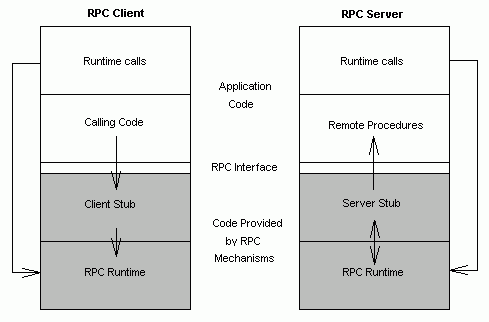
An RPC server or client contains application code, one or more RPC stubs, and the RPC runtime. RPC application code is the code written for a specific RPC application by the application developer. Application code implements and calls remote procedures, and also calls any RPC runtime routines the application needs. An RPC stub is an interface-specific code module that uses an RPC interface to pass and receive arguments. A server and a client contain complementary stubs for each RPC interface they share. The DCE RPC runtime manages communications for RPC applications. In addition, the DCE RPC runtime supports an application programming interface (API) used by RPC application code to enable RPC applications to set up their communications, manipulate information about servers, and perform optional tasks such as remotely managing servers and accessing security information.
The following figure shows the relationship of application code, stubs, and the RPC runtime in the server and client portions of an RPC application. The arrows show the direction calls are made by pointing to the called code.
The Parts of an RPC Application

RPC application code differs for servers and clients. Minimally, server application code contains the remote procedures that implement one RPC interface, and the corresponding client contains calls to those remote procedures.